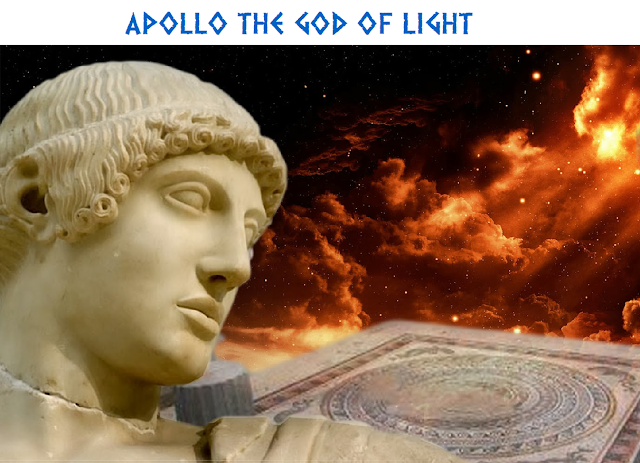Hear me, you who posses deep-wooded Helicon,
fair-armed daughters of Zeus the magnificent!
Fly to beguile with your accents your brother,
golden-haired Phoebus who, on the twin peaks of Mount Parnassus,
escorted by illustrious maidens of Delphi,
sets out for the flowing streams of Castalia, visiting
the Delphic promontory, the prophetic pinnacle.
Behold glorious Attica, nation of the great city which,
thanks to the prayers of the Tritonid warrior,
occupies a hillside sheltered from all harm.
On the holy altars, Hephaestos burns the thighs of young bulls,
mingled with the flames, the Arabian incense rises to Olympos.
The shrill rustling lotus murmurs its swelling song, and the golden kithara,
the sweet-sounding kithara, answers the voice of men.
And all the host of poets, dwellers in Attica, sing your glory, God,
famed for playing the kithara, son of great Zeus,
beside this snow-crowned peak, oh you who reveal to all mortals
the eternal and infallible oracles.
They sing how you conquered the prophetic tripod
guarded by a fierce dragon when, with your arrows
you pierced the gaudy, tortuously coiling monster,
so that, uttering many fearful hisses, the beast expired.
They sing, too, of how the barbarous army of the Gauls, who invaded the land in an impious manner, perished within rivers of melted snow.
Performance by :Lakis Halkias
Κέκλυθ' Ἑ -- λικ - ῶνα βα-θύ-δεν-δρον αἵ λά-χ-ετε
Δι-ὸς ἐ-ρι-βρόμουου θύ-γα-τρες εὐ-ώ-λενοι,
μό-λε-τε,συν-ό-μαι-μον ἵ-να Φοιοῖ-βον ὠι-δαεῖ-σι
μέλ-ψη-τε χρυ-σε-ο-κό-μαν, ὅς ἀ-νὰ δι-κό-ρυν-βα
Παρ-νασ—σίδος ταᾶσ-δε πε-τέ--ρας ἕ—δραν ἅμ' ἀ-γα—κλυ—ταιεῖς
Δεελ—φί-σιιν, Κασ-τα λί-δος
εοὐ-ύ-δρου νά-μματ' ἐ-πι-νί-σε-ται Δελ-φόν ἀ-νὰ
πρωῶ-να μααν-τειεῖ-ον ἐφ-έ--πων πά-γον.
Ἤν κλυ-τὰ με-γα-λό-πο-λις Ἀθ-θίς, εὐ-χαιεῖ-σι
φε-ρό-πλοι-ο ναί-ου-σα Τρι-τωω-νί-δος
δά-πε-δον ἄ-θραυστον• ἁ-γί-οις δὲ βω-μοιοῖ-σιν
Ἅ-φαιστος αἰεί-θει νέ-ων μῆ-ρα ταού-ρων•
ὁ-μουοῦ δὲ νιν Ἄ-ραψ ἀτ-μός ἐς Ὄ-λυμ-πον ἀ-να-κίδ-να-ται•
λι-γὺ δὲ Λω-τοὸς βρέ-μων αεἰ-ό-λοις
μέ-λε-σιν ὠ-δαάν κρέ-κει.
Χρυ-σέ-α δ' ἁ- δύθρους κί-θα-ρις ὕμ-νοι-σιν ἀ-να-μέλ-πε-ται.
Ὁ δὲ τεχ-νι-τωῶν πρό-πας ἑσ-μός Ἀθ-θί-δα λαχών
τὸν κι-θα-ρί-σει κλυ-τὸν παῖ-δα με-γά-λου Δι-ὸς ὑ-μνοῦ-σί σε
παρ' ἀκ-ρο-νι-φῆ τον- δε πά-γον, αἄμ-βροτ' ἀ-ψευ-δὲ
ὅς πᾶ-σι θνα-τοιοῖς προ-φαί-νει εις λό-γι-- α,
τρί-πο-δα μαν-τειεῖ-ον ὡς ειεἷ-λες,
ἐχ-θρὸς ὁν ἐφρ-ου-ούρειει δρά-κων,
ὅ-τε τε-οῖ-σι βέ-λε-σιν
ἔ-τρη-η-σας αἰ-ό-λον ἑ-λικ-τὰν φυ-άν,
ἔσθ' ὁ θηρ συχ-νὰ συ-υ-ρίγ-μαθ' ι-ἱ-εὶς ἀ-θώ-πευτ' ἀ-πέ-πνευσ' ὁ-μῶς•
ὡς δὲ Γα-λα-ταᾶν Ἄ-ρης βάρ-βα-ρος,
τάνδ'ὁς ἐπὶ γαῖαν ἐπέραασ' ἀ-σέπτως,
χι-ό-νος ὤ-λεθ'ὑ-γραῖς βο-λαῖς.
Ἀλλ'ἰὼ γε-ένναν.
SOURCE FOR THE ENGLISH TRANSLATION: HERE













No comments:
Post a Comment